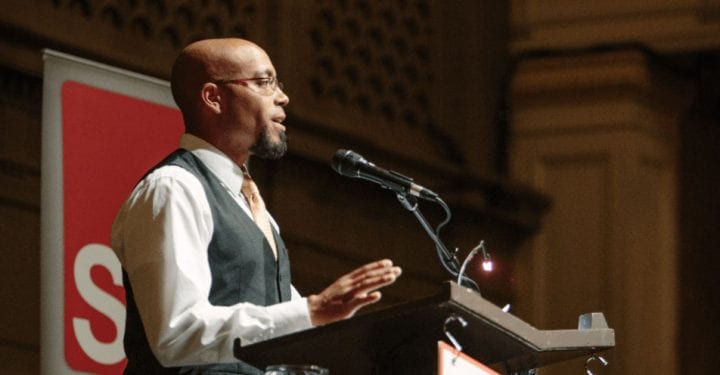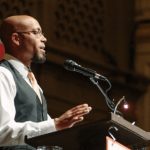
WITS Voices: On Representation & Teaching Youth of Color
March 20, 2018
By Daemond Arrindell, WITS Writer-in-Residence
The mentor texts used in my classes are usually quite diverse, with the intention of reflecting the demographics of the students, as well as countering the lack of representation of writers of color in the academic canon. As such, the students I work with are exposed to more than just Maya Angelou and Langston Hughes and get to hear modern stories that mirror many of their own experiences. In previous years, when I taught at South Lake High School the population was predominantly students of color with a small percentage of white students.
This year, however, every single student I worked with identified as a youth of color—and at a credit retrieval school, where the students have had numerous barriers to a successful academic career (moving, abuse, poverty, violence, pregnancy, etc.) and often lack either a belief in themselves and/or positive role models. It became vital in my mind that every single writer I brought to them looked like them and epitomized the breaking of stereotypes, empowerment, or social justice.
It was the first time I had played the Judgment Game — the introductory exercise I do with students where I ask them to voice their assumptions and tell me who I am, including where I was born, how old I am, what my sexuality is, and my socio economic status when I was a kid – with only students of color. And it hit me, with each of the three classes, how important representation is, because they made a lot of the same stereotypical assumptions about me, if not more, than white students. If the primary role you see Black people in society is entertainers and athletes, then the assumptions you will make about everyday Black people will be severely limited. And that limited viewpoint affects them all, how white kids see them and how kids of color see themselves.
The conversations the students were willing to have with me, inspired by the mentor texts as well as their favorite songs and artists, were eye opening, heavy and transformative. Their limitations and limited viewpoints were never due to a lack of interest or intelligence, only a lack of exposure. So, whenever we spoke, very matter-of-factly, about racism, sexism, mental health, women’s rights, politics or the current state of education, I was often blown away by their insight while also disheartened by how quickly they sometimes were to just accept things as they are.
Agency is a privilege few of them have access to, so the facade they display can easily be mistaken for apathy, when it’s much more of a defense mechanism. Positive options are not easy to come by for these young adults, so whenever they showed some glimmer of hope for their own futures or empathy for each others’ experiences I made a point to praise them for it. They know nothing comes easy. For them, the only things that have are going to be the ones that also take the most. And, in spite of the hardships they have all face, they are still kids, Kids who love to laugh, love to be silly, and most importantly to me — love to learn.
At the end of our month long residency together I asked the students to reflect on a few things. Their responses follow.
Why did I exclusively choose writers of color for the mentor texts?
- historically, these voices have been marginalized
- to open up our views on ourselves as people
- to show us that all people can and do change things
What do you think is the point of having students, especially students of color, write about themselves so much?
- to show them that their voices are powerful
- to know who they are
- to empower youth to have a say in their future
- because the struggle is real for us
- to prove that you aren’t worthless, that you are smart
- because a lot of students, especially people of color, agree that they have never been given a platform to express themselves. Poetry offers that.
What did you get out of this poetry residency?
- nobody can say what I am thinking like I can
- I remember who I am
- I talked about things I never share with other people
- that I can change, made me more open minded than I was
- I accomplished knowing what matters most to me

Daemond Arrindell is a poet, performer, and teaching artist. He is currently a faculty member of Freehold Theatre and is co-facilitating a poetry and theater residency at Monroe Correctional Complex for men, in addition to working as a Writer-In-Residence through the Writers in the Schools Program. In 2012, he taught Seattle University’s first course in Slam Poetry. He has performed in venues across the country and has been repeatedly commissioned by both Seattle and Bellevue Arts Museums.